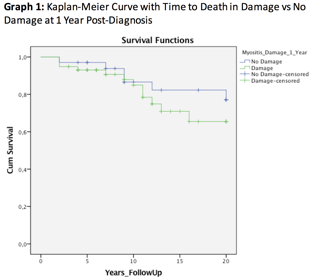Session Information
Date: Tuesday, November 15, 2016
Title: Muscle Biology, Myositis and Myopathies - Poster II: Clinical
Session Type: ACR Poster Session C
Session Time: 9:00AM-11:00AM
Background/Purpose: Idiopathic inflammatory myopathies (IIM) are a group of rare diseases, including dermatomyositis (DM), polymyositis (PM) and juvenile dermatomyositis (JDM). Patients often need long-term treatment with corticosteroids and immunosupressive drugs, as full remission is uncommon. A method to evaluate damage accrual in these patients has been previously developed1 and our aim was to determine if early damage in the course of the disease is predictive of mortality.
 The type of damage in each group is described in table 1.
The type of damage in each group is described in table 1. 
Methods
: We reviewed the clinical records of 92 patients with IIM (Bohan and Peter criteria) with at least 2 years of follow up. JDM patients diagnosed before the age of 16 were excluded. The patients were evaluated according to gender, ethnicity, age at diagnosis, use of corticosteroids and immunosupressive therapy and time of follow-up. Damage captured by the Myositis Damage Index (MDI) was assessed 1 year post-diagnosis and for those who died within 20 years of diagnosis, the year and cause of death were also determined. Time to death was analysed using Cox regression and Kaplan-Meier, and patients who were lost to follow up were censored at the time of the last observation.Results
: Sixty-seven patients were female (72.8%), the mean age at diagnosis was 41.6 years (95% CI 38.5-43.81) and the mean time of follow up was 13.54 years (95% CI 11.65-15.43). Sixty-three per cent of patients were White, 22.8% Afro-Caribbean, 13% South Asian and 1.1% Black. Thirty-eight per cent had DM, 32.6% PM, 26.1% overlap syndrome and 3.3% JDM. For every 1 point increase in the MDI score at 1 year post-diagnosis, the patient was 1.486 time more likely to die; HR 1.486 (95% CI 1.096-2.016; P = 0.011). A Kaplan-Meier survival curve between patients with no damage (MDI score = 0) and with damage (MDI score >/= 1) also showed a difference between the 2 groups, but it was not statistically significant (graph 1). The type of damage in each group is described in table 1.
The type of damage in each group is described in table 1. 
Conclusion : Early damage in the course of IIM is associated with increased mortality up to 20 years after diagnosis. Further studies are necessary to establish the factors which contribute the most to this early damage. References: 1- Sultan SM et al. Ann Rheum Dis. 2011;70(7):1272-1276.
Disclosure: S. Guerreiro Castro, None; P. Mota, None; D. A. Isenberg, None.
To cite this abstract in AMA style:
Guerreiro Castro S, Mota P, Isenberg DA. Early Damage and Mortality in a Cohort of Patients with Myositis Followed up to 20 Years [abstract]. Arthritis Rheumatol. 2016; 68 (suppl 10). https://acrabstracts.org/abstract/early-damage-and-mortality-in-a-cohort-of-patients-with-myositis-followed-up-to-20-years/. Accessed .« Back to 2016 ACR/ARHP Annual Meeting
ACR Meeting Abstracts - https://acrabstracts.org/abstract/early-damage-and-mortality-in-a-cohort-of-patients-with-myositis-followed-up-to-20-years/
